- Home
- Mackenzi Lee
The Lady's Guide to Petticoats and Piracy Page 10
The Lady's Guide to Petticoats and Piracy Read online
Page 10
“I’d make it count even if I had twenty, thank you.”
“And you wonder why I worry about you charming your way into a wedding party,” she murmurs, and I truly cannot tell if she’s about to smile or grimace.
The butler returns before I can reply, leaving Sim aggravatingly with the last word. I’m escorted into a sitting room off the entryway and seated upon a sofa. I try to neither settle too far back upon it nor sit too close to the edge, wishing for perhaps the first time that I actually had sat a lesson at the finishing school my father was determined to send me to just to better create the illusion of ladyship. There are so many invisible layers to decorum that you don’t think of until you’re staring them down across a fancy parlor. I have never done any sofa sitting in my life that felt as though it mattered as much as this.
There are footsteps in the hallway, and I stand, expecting the butler, but instead in prances a dog the size of the sofa, gangly limbs and swinging jowls and a coiffure of a tail that bobs above him like a feather in a jaunty cap. His coat is shiny with care, blemished only by the bubbles of saliva gathering in the folds of his lips.
The dog bounds over to me and presses his head into my knees with such enthusiasm that I promptly sit down again on the sofa, which only delights him further, for it makes my face more accessible to his mouth. He leaps at me with what I guess from his tail and perked ears is joy at the prospect of a new friend, but he’s overly zealous and comes at me with his enormous jaws gaping wide. I shriek without meaning to, though in my defense, what rational being wouldn’t when approached by an open mouth in which your whole head could fit?
“Maximus, down! Off, get off her! Max, come here!”
The dog is wrangled off me, our only connection the long strings of drool that run between his mouth and my shoulders.
“Sorry, sorry, he’s harmless. He’s such a big love; he just wants to be chums with everyone and doesn’t seem to realize he’s bigger than they are.”
I look up, and she looks up at the same time from where she’s crouched on the floor with her arms around the neck of her dog, and there is Johanna Hoffman.
It is not so long that we have been apart, but in this moment, our two years of separation feel more enormous than all the years we spent together. The difference between fourteen and sixteen feels like centuries, time the greatest distance that can stretch between two people. There is no chance I would not have recognized her, but somehow she’s a different person from my memories. Her hair is the same brown, so dark it’s almost black, eyes hooded and deep green, but it’s like she’s better settled into her own skin. She was a round child with spotty cheeks adolescence wasn’t kind to, but either time or expensive milk baths or a very well-laced set of silk stays has made her into a Renaissance muse, shapely and curved in a way my stocky, geometric frame never will be. Even under the wide panniers at her waist, her hips swing. Her face is powdered white with just the faintest hint of rouge, as though she has been caught in a maidenly blush.
Or maybe she’s blushing in earnest to see me. I might be as well. For even as I look at her, in a bright, dreamy blue day dress with an embroidered bodice and a tiered skirt and two strings of pearls around her neck, all I can think of is the girl who used to walk barefoot with me in streams, never caring if her hems muddied, who grabbed a snake by the throat and carried him off the road to save him from being bisected by a carriage. Who went with me to the butcher’s shop to watch them empty entrails from the pigs and cows and helped me understand how everything inside of a thing wound together. Johanna Hoffman had never minded dirt under her fingernails, until suddenly she had, and that was when she had left me behind in favor of company she had decided was more appropriate for her new self.
A part of me, I realize as she stands, one hand resting upon her massive dog’s head (the only sound is him panting like a windstorm), had hoped that I would find her with muddy knees from running through the grounds, shoes worn through at the toes, her hair studded with twigs and her pockets full of the baby birds she’d rescued when they fell from their nests.
But instead, with her hair curled and her breasts pushed up, she’s the cream puff that I cut all ties with.
“Felicity,” she says, and zounds, I had forgotten how high her voice is—it was a singsong soprano even when we were children, but in that excessive dress, it feels put on, like she’s playing up the girlish simper. I scrunch up my forehead without meaning to, then remember I am trying to win her over. I am trying to remind her we were friends.
Dear Lord, were we?
“Johanna,” I say in return, and I make myself smile, because she is marrying Dr. Platt, and I want to work for Dr. Platt, and there’s no chance I’ll ruin that by making a bad impression on the person who likely has the most influence over him. Or rather, I’ll try not to ruin things any more than I did two years ago. “It’s so good to see you.”
She does not return the smile. “What are you doing here?”
“I’m . . . what am I . . . that’s actually rather a good story. So since we last saw each other . . . or rather, since you left . . . your father died, which is . . . I’m . . . Sorry, is your dog all right?” I’m trying not to stare at the saliva foaming upon his lips, but it’s impossible not to. “He’s breathing rather heavily.”
Johanna doesn’t look away from me, nor does she uncuff the beastie. “He’s fine. That’s just how he sounds.”
“Consumptive?”
“Alpenmastiffs have a lot of excess skin to breathe through.” She reaches down and swipes a handful of slobber ribbons from under his mouth, and for a moment, there she is—my best friend who loved animals and feared no mess. But then she looks around for something to wipe her hand upon and, finding nothing, waves it about with her fingers splayed until the butler appears with a handkerchief.
Then we’re alone again, staring. Each a ghost to the other.
“May I sit down?” I ask.
She gives me an indifferent shrug, so I resume my perch upon the couch. Max lunges forward, my face once again at the perfect angle for examining it with his tongue, but Johanna catches him by a roll of back fat—so many folds and so much hair I lose sight of her hand for a moment—and pulls him over with her to a chair, where she wraps her arms around his neck and rests her chin upon his head, pinning him in place. “What are you doing here?” she asks again, her eyes fixed on me.
“I’m here for your wedding.”
“I thought you might write.”
“I tried, but your gentleman said it didn’t arrive, so I expect a week after you’re wed you’ll get my missive about coming to your wedding—”
“I don’t mean about the wedding,” she interrupts. “I thought someday you might write to me. As a friend.”
A vein splits open inside me, guilt and hurt spilling out in equal measure. “I did,” I say. “About the wedding.”
She looks away, the tip of her tongue jutting out between her teeth. “How did you hear I was getting married?”
“Oh, you know, things travel around. Gossip and . . .” I stop. Johanna licks her lips. Max also licks his, tongue wrapping all the way around his nose. “I’ve been at school,” I say, which is the lie I decided upon, for it most closely aligns with what I am currently supposed to be doing—it’s unlikely that Johanna, so far from home, would have heard about my disappearance during my Tour, and even unlikelier that, had she known, she would have run to my father and put an X upon the map for him to mark my location. Most unlikely of all that he would care. But lies are easiest to believe—and to remember—when they bump against the truth. And school is a good excuse for my limited wardrobe.
“School?” She smiles, and it is the first time she’s looked like herself. “You finally got to go.”
“I mean, it’s not quite . . . yes.” It’s not worth digging into the injustice of the fact that the school I should currently be attending is one for manners and not medicine. “Yes, I got to go to school. And you . . . have a gia
nt dog! And you’re getting married! That’s . . . a thing that is happening and that’s wonderful for you, it’s so wonderful. Just . . . wonderful. That we both got . . .”
“Got what we wanted,” she finishes for me.
Did we? I want to shout at her. Because once we wanted to go on an expedition together and collect previously unknown medicinal plants and species and bring them back to London to be cultivated and studied. I thought I had long ago cut Johanna from me like a cancer, but you cannot simply hack yourself apart in hopes of healing faster.
Best not to have friends at all, I remind myself. Best to explore the jungles alone.
I am unraveling, and Johanna is still staring at me like I’m a spider crawled up from the floorboards and inching toward her. What I would like to say is that I remember when she aspired to more than a rich husband and domestic bliss. I remember how she audaciously declared that she would be the first woman to present before the Royal Society. That she would go on expeditions. Bring new species home to England to study.
“I can’t wait to meet your fiancé!” I blurt. “Dr. . . .”
I fake a fumble for the name, like he hasn’t been a saint to me for years and like he’s definitely not the reason I’m here.
“Platt,” Johanna finishes for me. “Alexander Platt. You don’t have to pretend.”
“Pretend what?”
“That you don’t know who he is. You love his books.”
“You remember that?”
“You wanted me to name that kitten I found under our house Alexander Platt, even though she was a girl.”
“Alexander could be a . . . gender-neutral name.” I scratch the back of my neck. The collar of my dress feels very tight. I was hoping she had forgotten my obsession with Alexander Platt so that she could have no leverage against me. Knowing how much I want to meet him, how much I admire him, means she knows where to wound me. She knows how savage it would be to turn me out now. “How did you two meet?”
“He and my uncle are in business together.” She mashes her thumbs behind the dog’s ears, and he closes his eyes in bliss. “Dr. Platt is organizing a scientific expedition, and my uncle is providing the ship for the voyage. He came over for dinner one evening to discuss finances and I was just . . . smitten!” She throws her hands up in the air like she’s tossing confetti.
I wonder if it’s appropriate to ask how soon they’re leaving and what research he’s working on. All I want to ask about is Platt.
But then Johanna pulls in her cheeks too hard and bites down upon them so that she looks like a fish. It’s a nervous habit from childhood, one she used to do so often in the presence of her father that the insides of her cheeks would bleed. And for a moment, I’m ten years old again, and I know her as well as I know the sound of my own voice. As much as I had told myself over and over that I wasn’t here for Johanna, she didn’t matter, I am here only for Platt and don’t care what she thinks of me anymore, I suddenly find myself blurting, “I should have written.”
Her face relaxes, lips falling back into their painted part.
I swallow. “I mean, I shouldn’t have had to write, because I should have apologized after your father died. Before you left. I should have apologized, and we should have been writing each other all this time because we were friends. And I’m sorry I didn’t do any of that.”
“I wish you had.” The dog rests his head upon her lap, and she strokes his nose absently, her eyes still on me.
“I’m sorry I’m here,” I say. “I can leave, if you want.”
From out in the hallway, I swear I hear Sim choke.
“No,” Johanna says quickly. “No, don’t leave. I want you to stay.”
I take perhaps my first deep breath since we left England, so loud it rivals Max’s consumptive snuffles. “Really?”
“You sound surprised.”
“I am. I mean, if I were you, I wouldn’t want anything to do with me.”
She stands up, her hand disappearing again into the folds of her dog. Her skirt fans around her, a cascade of brocade silk and too many petticoats, the edges fringed with lace and bows. When she looks at me, I am disarmed. “Well then,” she says, and I don’t know how I shall survive these next few days without drowning in her. “Lucky you’re not me.”
8
At dinner, I expect I shall get my first glimpse of Alexander Platt.
The dining room is crowded, and I am relegated to a place of dishonor as far from the head of the table, where Johanna’s uncle Herr Hoffman sits, as is possible. I practically need a telescope to see him, and Johanna sitting beside him, with another empty chair beside her. Maddeningly empty, and no doubt reserved for her intended.
It is still empty when the first course is served. It is still empty when the man beside me, who has to keep putting down his knife to pick up his ear trumpet, asks me, “How do you know Miss Hoffman?”
“We were friends as children,” I say, jamming a frustrated knife at my mutton.
“Excuse me?”
“We grew up together,” I say louder.
He cups a hand to the end of his ear trumpet. “What?”
“Friends.”
“What?”
I nearly fling my knife down. “We were accomplices in a massive diamond heist in which we stole jewels off the neck of the queen of Prussia, and now I’m here to claim what is owed me by any means necessary.”
“Excuse me?” The woman next to me leans forward in alarm, but the man just smiles. “Oh, how nice.”
To top the fact that Alexander Platt is not even here, the dress Sim purchased in town was made with a waistline that can only be described as aspirational. Sim had to fish me out of the silk and tighten my stays three times before I achieved the inconceivably small diameter deemed appropriate for a lady to make an impression at a social occasion. My bulbous shoulders feel likely to burst free at any moment.
It’s hard to focus on the meal when I’m thinking about Dr. Platt, and when I can’t properly breathe, and also every time Johanna laughs, my heartbeat stammers. How is it, I wonder, that the brain and the heart can be so at odds and yet have such a profound effect upon the functions of the other?
Dr. Platt has still not arrived by the end of dinner. The men go to the formal sitting room, while the ladies make their way upstairs. I, for longer than is natural, stand in the hallway, weighing my options but likely looking as though I’m a shape-shifting fairy-tale creature able to choose which sex I would rather be for the evening. If Dr. Platt is to show up, he will certainly not be up in Johanna’s rooms with the ladies. And I am not here to waste time talking about ribbon and music and whatever other insubstantial nonsense gets passed around in rooms full of women.
I start toward the parlor, hoping that if I walk with enough confidence I’ll not be stopped, but the hairy-eared butler has me by the collar before I’ve crossed the threshold. “The ladies are upstairs, Miss Montague.”
“Oh.” I smile but do not attempt the eyelash bat again. “I’ve just got one quick thing to say to Herr Hoffman and then I’ll follow.”
He is unmoved. “I can convey the message to him.”
“Oh, thank you, but actually I lost an earring here earlier and I wanted to look for it.”
“I’ll search for you.”
I pretend to see someone in the room over his shoulder and wave. “I’ll be right in!” I call to this imaginary person. The butler doesn’t move. I consider faking a fainting spell just for an excuse to call for a doctor and hope it’s Platt, but that hardly seems an appropriate situation to then funnel into an intellectual discussion. “Please,” I say to the butler, and I hate how pleading my voice sounds. I do not like pleading—reliance upon the whims of others makes me far too vulnerable to feel comfortable.
“Excuse me,” someone says behind me, and the butler pulls me out of the way so the man can pass into the room.
I glance sideways and recognize him at once from the etching of his likeness on the title page of Treati
es on Human Blood and Its Movement through the Body.
“Alexander Platt,” I blurt.
He stops. Turns back to me. “Can I help you?” It’s not a courteous question—it’s brusque and annoyed.
He looks exactly like himself, but more rumpled than I expected. He’s unshaven, dark stubble in sharp contrast to his blond wig with its ratty queue. His housecoat is not the sort of thing you’d wear to a party before your wedding in which you’re trying to make a good impression in the home of your bride. He has an intense gaze, small dark eyes made smaller by a fringe of thick brows, and when he frowns at me, I forget every word I know.
All I manage to stammer is, “You’re Alexander Platt.”
He flips the lid of the snuffbox in his hand, glancing over his shoulder at the room full of gentlemen waiting for him. “Do we know each other?”
“I’m Johanna Hoffman. I mean, I’m a friend of Johanna’s. I’m for the wedding. Here for the wedding.” Am I having a stroke? Not only are all the words I wish to say putting themselves in a random order in my brain, but I’m almost certain my voice is far too loud and my movements far too exaggerated. I’ve gone completely blank, all my planned brilliance with which I was going to win him over washed away at the sight of Alexander Platt in the flesh.
He’s looking at me, and all I can think to say is, “Hullo!” And it comes out much higher than my voice usually is. Perhaps this is how people feel when they talk to someone they fancy—all fluttery and silly and everything tuned to the highest key. I’ve certainly heard Monty’s voice pitch when Percy walked into a room.
I remember suddenly I have Dr. Cheselden’s card in my pocket, stashed there for exactly this meeting, and I start to paw at my excessively large skirt for it.
“Dr. Platt, you join us at last!” Johanna’s uncle calls from the room, and Platt raises a hand. Before I’ve even had a chance to find my damn pocket, he gives me a nod and says, “Have a good night.”
“Wait, no!” I try to chase after him, but the butler catches me again. My arm whips out as he pulls me back, knocking a portrait off the wall. The glass cracks when it strikes the tile. Dr. Platt glances over his shoulder, and I’m not sure if I imagine it or if he actually winces. The butler stares at the broken frame, then at me.

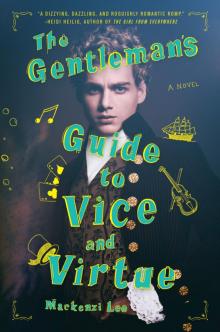 The Gentleman's Guide to Vice and Virtue
The Gentleman's Guide to Vice and Virtue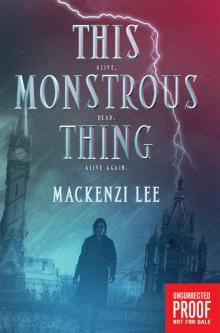 This Monstrous Thing
This Monstrous Thing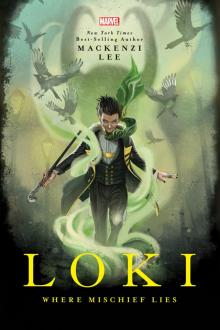 Loki
Loki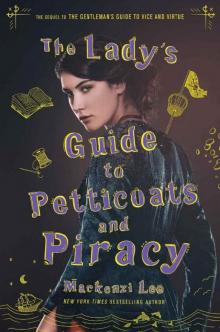 The Lady's Guide to Petticoats and Piracy (Montague Siblings #2)
The Lady's Guide to Petticoats and Piracy (Montague Siblings #2)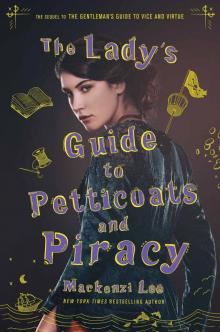 The Lady's Guide to Petticoats and Piracy
The Lady's Guide to Petticoats and Piracy